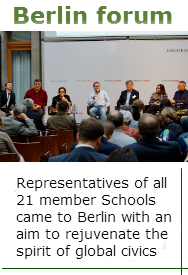Current events

The main aim of the session “Belarus in the Modern World” was to motivate the students to think about Belarus, to consider the problems it is facing and think about opportunities for its development. The invited experts were: Dr. Leonid Zaika (Minsk, Belarus), Chairman of the Board of the EESPS Advisory Council and Head of the analytical center "Strategy" ; Dr. Kiryl Koktysh (Moscow, Russia), member of the Board of the Advisory Council; Associate Professor of MGIMO University; Dr. Natalia Amelchenko (Kyiv, Ukraine), Head of Political Science Chair, National University "Kievo-Mogiljanskaja Academia"; and Dr. Pavel Usov (Warsaw, Poland), Expert of Center for European Studies and Warsaw Analytical Workshop. They presented their vision of the problems Belarus is facing and opportunities for its development. Different approaches and views of the experts, leading to serious and passionate debates, let the students look deeper into the problems discussed during the session.
Valentin Lopan (Minsk, Belarus), Director at Business Relations Agency gave a lecture on “Branding Belarus: Challenges and Opportunities for the country”. The discussion on the image of Belarus in the world, the kind of mutually beneficial cooperation it can offer to its potential partners, and how image and reputation are formed in general, aroused a keen interest among the participants and took more time than had been initially foreseen.
By tradition, half of the session was held in an interactive way: team building, training on leadership, methods of joint intellectual activity, work in small groups. Interactive methods of work were organised by Mr. Ihar Shary and Dr. Yuliya Salnikava, trainers and members of the Association of Consultants and Trainers and also by Dr. Kiryl Koktysh.
The participants of the session left Ivano-Frankivsk with homework and the results of their work will be presented at the Round Table in June 2013.








